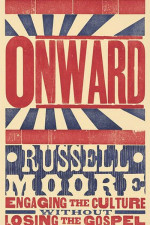
by Brian Hobbs | Jul 7, 2015
“The Collapse of the Bible Belt,” “A New Era of Cultural Engagement,” “No Longer a (Moral) Majority,” “Learning to be Pilgrims (Again)”: These are just a few of the timely topics covered in a fantastic new book by Southern Baptist author and ethicist, Dr. Russell Moore, called Onward: Engaging the Culture without Losing the Gospel.
 Published by B&H Books and debuting on August 1, I cannot recommend this book any more highly. This was the best, new non-fiction book I have read in years, and the topic needed to be addressed now more than ever.
Published by B&H Books and debuting on August 1, I cannot recommend this book any more highly. This was the best, new non-fiction book I have read in years, and the topic needed to be addressed now more than ever.
With the U.S. Supreme Court’s mandating same-sex marriage in all 50 states, Christians are scrambling. According to Moore, however, this is not a time to scramble. Nor is it a time “to panic or cave in.”
Throughout the book, Moore’s confidence will give you confidence. He does step on toes along the way, challenging our past presuppositions. Moore shows us, painfully, that the Gospel is not here to create Mayberry, if that place ever existed.
It’s not for “God-and-Country,” Boy-Scouts-of-yesteryear way of life we most need. That is not what we are fighting for and hoping for, as Christians. We are striving and praying for something so much worthier than these; namely, the Kingdom of Christ and His righteousness.
Practical in its approach, Dr. Moore’s book will equip pastors and lay people alike with the attitude and resolve they need to share the Gospel in these challenging times. He helps us realize that the Bible Belt has fallen and while that may be bad news for America, it’s good for the Church.
The book is one of the most quotable I have ever read. Consider these gems:
“We must fight for culture, yes, but we should never be such culture warriors we cannot be evangelists first.”
“The hope for the future is churches filled with people who never thought they fit the image of ‘Christian.’”
“The crisis in the American family isn’t downstream from Woodstock or the Pill…but downstream from the wreckage of Eden.”
“A worldly church is no good to the world.”
“A church that loses its distinctiveness is a church that has nothing distinctive with which to engage the culture.”
But catchy phrases and soundbites is not what Dr. Moore is about. He is about challenging our presuppositions to cause us to go deeper with God and go further with the Gospel than we might otherwise.
Today, it is same-sex marriage and threats to religious liberty that are perplexing the church. We will stand faithful at these points, all while we recognize that tomorrow, it may be another social issue that confronts us.
To quote Moore, “the signs of the times tell us we are in for days our parents and grandparents never knew. But that’s no call for panic or surrender or outrage. Jesus is alive. Let’s act like it. Let’s follow him onward to the future.”
To that, and everything Russell Moore penned in Onward, I say a hearty “Amen!”

by Brian Hobbs | Jul 3, 2015
Like most people, I am a fan of Pixar movies. From Toy Story to A Bug’s Life, from Finding Nemo to UP, these modern-day animated movie makers have a special way of creating enjoyable, memorable and often emotion-moving films.
Pixar’s latest installment, Inside Out, was one of their most ambitious yet and well done.
Plot summary
According to Internet Movie Database, “After young Riley is uprooted from her Midwest life and moved to San Francisco, her emotions – Joy, Fear, Anger, Disgust and Sadness – conflict on how best to navigate a new city, house and school.”
Positive elements
Most movies made do not have a child as the main character, with many notable exceptions (e.g. Annie). The two main characters in this movie are “Riley,” an 11-year-old girl, and her inner emotion “Joy,” each of whom are easy to identify with and work together well.
There are plenty of funny moments in this film. One of the funniest involves Riley’s long-ago imaginary friend. The movie, in her mind, depicts some strange, but cool, landscape and characters.
There also are some memorable quirky characters and moments that add depth to the movie. We feel what it means to be disgusted or sad. All of the tensions in the movie are resolved, and the character development is well done for an animated picture. While there are no memorable songs or specific lines, this movie provides plenty to remember for the viewer.
Negative elements
If there were a lot of bad words in this movie, I missed them. There are, however, are some presentations of romantic interest (e.g. Riley and a boy) that could be mildly problematic. A bigger problem comes when Riley’s mother, in a moment of frustration at her husband, remembers a time when she could have chosen another man. This was a low point for the otherwise fairly clean movie.
Spiritual content
This movie is make-believe. Therefore, you cannot judge it as presenting a full worldview. At the same time, it could be somewhat confusing to children, who are still figuring out the way the world works. What is obviously make-believe to grown-ups may not come across that way to children. So it is important to talk about the way God made us in His image. And it’s important to talk about that people have a body and a mind and a spirit, not a body and a mind that is acted upon by little emotion-humanoids within us. Unfortunately, there was no mention of God in this movie.
Overall
In a grander sense, Inside Out allows children to understand and even feel a wide array of emotions, including sadness and sacrifice. This is much-needed in our happiness-at-all-cost approach today. If you are looking for an explicitly Christian movie, this is not it. If you are looking for a good movie to enjoy and spark some good conversations and memories, Inside Out might be just the one for you. This particular Pixar film won’t go down in history as their very best, like Toy Story, but it will be considered a success.
Rating
3 out of 4 stars
Photo: http://movies.disney.com/inside-out/

by Brian Hobbs | Jul 2, 2015
Disclaimer: This article focuses on how Christians can talk about same-sex marriage with their own teens and youth. If you are a same-sex marriage proponent, you have every right to promoting your opinion, and we would ask the space to promote our view as well. In this attitude of mutual respect, I present this primer, designed for teens and youth.
In the years leading up to the Supreme Court’s sanctioning of same-sex marriage, there were plenty of opportunities or cultural moments that parents could have seized to talk about homosexuality, same-sex marriage in light of the Bible, with their kids.
Many chose to ignore the issue. Today, the idea is now here and it can no longer be ignored. Russell Moore of the SBC’s Ethics & Religious Liberty Commission has a very helpful article on how to address this issue with children.
But what about youth, those who are more likely to know a gay friend at school? Teens are in that logic phase of life, trying to figure out the world around them (which explains why they can be so argumentative, just as I was), so they are a big key to this public conversation.
Here’s what I think we can say to some of the popular statements they hear or may even use.
- “Love Wins! It’s just that simple.”
What kind of love won? In English, we use the word love to mean many things. I love chocolate. I love this TV show. I love my wife. In the biblical language, however, there are four loves. The first love is “affection” or affinity (Think of when you like a breakfast cereal or song on iTunes). The next of the natural loves is friendship, and the third is romantic love (in Greek “Eros”). The fourth love is the love of God (in Greek “Agape”). If any love won here, it was “eros.” But even then, we believe that it was not the proper form of romantic love that “won.”
“All gay people wanted was to have the right to marry, too!”
For years, there has been an organized group of people—activists—who through cultural, financial and other ways, worked to bring same-sex marriage to this country. Most people who are pursuing same-sex marriages do not fall into this category. They are often regular people just trying to find happiness, in its various forms, and live life. They want what their parents or grandparents had.
One problem with that: Prior to this ruling, everyone in America already had the right to marry anyone they wanted; as long as that person was of the opposite sex, was not a minor and was not a relative. What has been granted here is not marriage equality; we already had that. What was granted is a special right to marry someone of the same sex.
- “What harm can gay marriage do?”
Relationships matter and not just to the people involved. We do not yet know what effect gay marriage will have on any children brought up in homes. What we do know is that every person alive has a mother and a father. Even if that person did not ever know their father or even their mother, they have one (biologically speaking and relationally speaking). In God’s creation, every child has a mother and a father and every child deserves a mother and a father. By pursing same-sex relationships, we are harming children by denying them one or both of these.
- “But they love each other!”
If the main reason to get married is because you are in love, it would be easier to see why people may approve same-sex marriage. In Christianity, however, marriage is for more than feelings. Marriage is primarily (but not exclusively) for having and raising children and to depict the Gospel. Marriage has to be, first and foremost, about these grand purposes and not our emotions. Just like eating food is primarily nutrition and survival, but God gives us good taste too, marriage is primarily for procreation and God gives us love too. Same-sex marriage fails to fulfill these higher purposes, no longer how strong the love people feel.
- “Why does it have to be one man and one woman anyway?”
We don’t believe same-sex marriage is just immoral. We believe, as Russell Moore points out, that it is impossible. Why one man and one woman? Because that’s where babies—that’s where all people—come from. Furthermore, this is what the Bible teaches. In the beginning, God made a man and a woman, and the “two became one flesh” in marriage (Gen. 1:27). Jesus, in the New Testament, explicitly affirmed this marriage design (Matt. 19:1-10). The Apostle Paul also affirmed the Christian meaning of marriage in his epistles (1 Cor. 7) and even made monogamy a requirement of church leadership (1 Tim. 3).
- “You’re just being closed-minded, like people who were against interracial marriage before.”
A person’s race or skin color is different than their behavior or even desires. People who oppose interracial marriage go against the Bible (remember that Moses married a woman of another race). While many professing Christians have wrongly stood against interracial marriage, they were wrong to do so. Their wrong attitude on that should not be equated with biblical convictions about same-sex marriage.
- Why won’t you just go along with this? Why stop it?
Biblical Christians are not stopping anyone from pursuing these relationships. We are warning them against homosexual behavior, believe it is contrary to God’s plan (Rom. 1, 1 Cor. 6) and is self-destructive. More than that, we are simply promoting our viewpoint, that Christian marriage is God’s best. As Russell Moore said, it is not that we won’t approve of gay marriage. It’s that we cannot, because our consciences are captive to the Word of Christ.
- “Marriages in the church are bad. Who are you to judge other’s marriages?”
Pastor Rick Warren once said that divorce and cohabitation threaten the future of marriage even more than same-sex marriage. We agree with that, and we know that Christians have done more damage to marriage by casual divorce within the church than non-believers have done to it outside the church. It’s high time to live like we mean it when we say, “til death do us part.” At the same time we recognize that the only way not to be a hypocrite is to lower your standards. We should not lower our standards, we should raise our behavior.
These are just a few conversation points I have heard, in person and online. What do you hear?

by Brian Hobbs | Jun 26, 2015
The move toward same-sex marriage in America is now complete, though far from over. On Friday, June 26, the United States Supreme Court, citing some sloppy reasons rooted in the 14th Amendment of the U.S. Constitution, legalized same-sex marriage in all 50 states.
Reactions from traditional marriage proponents have been wise, insightful, encouraging and with a long-view of marriage and life in mind. Dr. Russell Moore said, “I am a conscientious dissenter from this ruling handed down by the Court today.”
In Oklahoma, two Oklahoma Baptist leaders spoke. Dr. Anthony L. Jordan, Baptist General Convention of Oklahoma Executive Director-Treasurer said, “Nothing has changed and everything has changed. Our position on marriage remains the same because our God and His truth have not changed. Marriage is biblically defined as the union of one man and one woman. A Supreme Court ruling, vote of congress, or poll of the people cannot change the truth of God’s Word. The landscape of law and our culture has changed. People of faith will face new challenges, and our religious freedom will likely come under assault. We will face those challenges with uncompromising faith and inclusive love for all.”
Dr. Hance Dilbeck, Senior Pastor of Quail Springs Baptist Church in Oklahoma City, who is serving as BGCO President, said, “This court ruling reflects the troubling shift we are seeing in our culture, away from the biblical view of marriage. At the same time, we recognize that the Christian view of marriage and sexuality always has been distinct, and often counter cultural. We stand by these convictions, and we will continue to contend for our views and live them out in our churches, while showing kindness and Christ’s love to all of our neighbors.”
I admire all three of these men tremendously and agree with their sentiments. It would be tempting to take a “Jeremiah” perspective in such a clear cultural defeat. Recall the weeping prophet, who did what God called him to do, did sometimes lapse into an overly woefully attitude. Even so, Jeremiah, in the midst of captivity, offered these beautiful words.
“This is what the Lord of Hosts, the God of Israel, says to all the exiles I deported from Jerusalem to Babylon: ‘Build houses and live in them. Plant gardens and eat their produce. Take wives and have sons and daughters. Take wives for your sons and give your daughters to men in marriage so that they may bear sons and daughters. Multiply there; do not decrease. Seek the welfare of the city I have deported you to. Pray to the Lord on its behalf, for when it has prosperity, you will prosper’” (Jeremiah 29:4-7).
Nehemiah did that kind of building in his own day. While he saw how bad things were, instead of just speaking into the situation, he did something about it. Instead of despairing, he set out to build. Take time even today to read the Book of Nehemiah.
When it comes to marriage, may we be like Nehemiah, not cursing those with whom with disagree. Let’s instead build a cultural of marriage within the church, that even the world recognizes as something joyous, fruitful and to be desired.
God help us.

by Brian Hobbs | Jun 24, 2015
Galvanized in national attention after the murder of nine church goers, South Carolina once again finds itself in the heart of controversy, about the Confederate Flag flying near its state capitol. Voices have risen up in favor of taking the flag down in South Carolina and elsewhere, including Russell Moore and even S.C. Governor Nikki Haley. Meanwhile, sales of Confederate flags have skyrocketed. Who is right in all this? I offer three observations:
1. What’s in a flag?
Flags have meaning. The Christian flag. The American flag and the “Republic for which it stands.” What does the Confederate Flag mean? Is it Southern heritage and history? Is it racism and hate? Or something in between or a mixture?
The first time I ever saw the Confederate Flag was as a boy, watching “The Dukes of Hazards.” Though I grew up in the Southwest, it was never a frequent sight in my life, and until I grew up and visited some Civil War battlefields, I never understood the significance of it.
Then in college, at one point, I had a “South-Will-Rise-Again,” Confederate-Flag waving friend. He was generally a nice guy, but I sometimes wondered if he could say with a straight face that he had no racial resentment or even racism in his heart.
Be that as it may, I recognize the appeal of history and heritage the flag has to many. I, too, love Gen. Robert E. Lee. Moreover, I believe that in the Civil War, both sides had admirable qualities (and poor qualities) to one extent or another, even as slavery had to be abolished at all costs.
Fast forward to today, much of society does not equate the flag with history and heritage, in large part because many who waved it in recent decades committed wrongs against people. As so often happens, a smaller group can mar something for a larger group.
2. When rights aren’t necessarily the right thing
When it comes to southern pride, there are ways to honor that heritage apart from the battle flag. In the case of the Confederate Flag, it has widely come to signify what side of the racial divide you are on.
South Carolina has not flown this flag continuously since its beginnings. The flag-flying tradition is only as old as the 1960s, when this country was in a pitch debate about racial segregation. In other words, flying the flag at the capitol is a relatively new tradition.
That is not to say this state does not have the right to fly the Confederate Flag, or individuals; it is to say they can choose not to. If a symbol becomes too tainted in people’s minds, or too divisive, it can be a measure of prudence to take the flag down.
3. Don’t demonize, dialogue
An issue this contested, this important, requires our best attention and best intentions. When debating the flag, don’t assume the worst about either party. For flag proponents, don’t assume opponents are ignorant people, bowing down to political correctness. For flag opponents, don’t assume everyone who has affection for the Confederate Flag is a deep-seated racist.
I, speaking for myself alone and no other person or group, favor the idea of taking down the Confederate Flag in South Carolina, for the reasons Russell Moore has stated.
It is my sincere prayer that as a nation, as a people, we can find a better day in this country when the ghosts of racism are fully chased out, especially among Christians. To that end, I say, Lord help us!

 Published by B&H Books and debuting on August 1, I cannot recommend this book any more highly. This was the best, new non-fiction book I have read in years, and the topic needed to be addressed now more than ever.
Published by B&H Books and debuting on August 1, I cannot recommend this book any more highly. This was the best, new non-fiction book I have read in years, and the topic needed to be addressed now more than ever.


